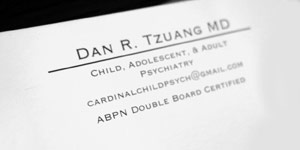Diagnoses Treated
Below you will find information about some of the conditions I can treat. Please take a look and give me a call to further discuss the specific details of your circumstances so that we can decide if I can be a good fit as a provider.
ADHD
Attention-deficit/hyperactivity disorder (ADHD) is one of the most common mental disorders affecting children. ADHD is a brain condition that is often first identified in school-aged children when it causes disruption in the classroom or problems with schoolwork.
ADHD can affect adults too. While some children seem to outgrow the disorder, or learn to compensate for the symptoms, others do not.
ADHD by the numbers
- 4.1% of U.S. adults (1.7% severe)
- 9% of U.S. adolescents (1.8% severe)
- 7 years old – the average age for children to be diagnosed with ADHD
Depression
Depression is a serious medical illness that negatively affects how you feel, the way you think and how you act. Depression has a variety of symptoms, but the most common are a deep feeling of sadness or a marked loss of interest or pleasure in activities. Other symptoms include:
- Changes in appetite that result in weight losses or gains unrelated to dieting
- Insomnia or oversleeping
- Loss of energy or increased fatigue
- Restlessness or irritability
- Feelings of worthlessness or inappropriate guilt
- Difficulty thinking, concentrating, or making decisions
- Thoughts of death or suicide or attempts at suicide
Depression is common. It affects nearly one in 10 adults each year—nearly twice as many women as men. It’s also important to note that depression can strike at any time, but on average, first appears during the late teens to mid-20s. Depression is also common in older adults. Fortunately, depression is very treatable.
Anxiety
Anxiety disorders are the most common of emotional disorders and affect more than 25 million Americans. Many forms and symptoms may include:
- Overwhelming feelings of panic and fear
- Uncontrollable obsessive thoughts
- Painful, intrusive memories
- Recurring nightmares
- Physical symptoms such as feeling sick to your stomach, “butterflies” in your stomach, heart pounding, startling easily, and muscle tension
Anxiety disorders differ from normal feelings of nervousness. Untreated anxiety disorders can push people into avoiding situations that trigger or worsen their symptoms. People with anxiety disorders are likely to suffer from depression, and they also may abuse alcohol and other drugs in an effort to gain relief from their symptoms. Job performance, school work, and personal relationships can also suffer.
Although each anxiety disorder has its own unique characteristics, most respond well to two types of treatment: psychotherapy and medications. These treatments can be given alone or in combination. Treatment can give significant relief from symptoms, but not always a complete cure. There are several effective medications and psychotherapies. Because treatment often requires several weeks to work best, a psychiatrist should follow the patient’s progress and make necessary changes. Unfortunately, many people with anxiety disorders don’t seek help. They don’t realize that they have an illness that has known causes and effective treatments. Other people fear their family, friends or coworkers might criticize them if they get help.
Bipolar
Bipolar disorder or bipolar affective disorder (historically known as manic–depressive disorder or manic depression) is a psychiatric diagnosis for a mood disorder. Individuals with bipolar disorder experience episodes of a frenzied state known as mania (or hypomania), typically alternating with episodes of depression.
At the lower levels of mania, such as hypomania, individuals appear energetic and excitable and may in fact be highly productive. At a higher level, individuals begin to behave erratically and impulsively, often making poor decisions due to unrealistic ideas about the future, and may have great difficulty with sleep. At the highest level, individuals can experience very distorted beliefs about the world known as psychosis, which can occasionally lead to violent behaviors. Individuals who experience manic episodes also commonly experience depressive episodes; some experience a mixed state in which features of both mania and depression are present at the same time. Manic and depressive episodes typically last from a few days to several months and can be interspersed by periods of "normal" mood.
Schizophrenia
Schizophrenia is a chronic brain disorder that affects more than one percent of the population. When schizophrenia is active, symptoms can include delusions, hallucinations, trouble with thinking and concentration, and lack of motivation. However, when these symptoms are treated properly, a large portion of those diagnosed will greatly improve over time.
There is no cure for schizophrenia, but treatments are available to reduce the intensity and frequency of the symptoms. Medication and psychosocial treatments can help some people with schizophrenia lead highly productive and rewarding lives, while for others, the illness continues to cause impairments in function despite treatment and family support.
A variety of antipsychotic medications are effective in reducing the psychotic symptoms present in the acute phase of the illness, and they also help reduce the potential for future acute episodes. Before treatment can begin, however, a psychiatrist should conduct a thorough medical examination to rule out substance abuse or other medical illnesses whose symptoms mimic schizophrenia.
Eating Disorders
Eating disorders are illnesses in which the victims suffer severe disturbances in their eating behaviors and related thoughts and emotions. Those suffering from eating disorders typically become obsessed with food and their body weight as well. Eating disorders affect some several million people at any given time, most often women between the ages of 12 and 35. There are three main types of eating disorders, anorexia nervosa, bulimia nervosa, and binge eating disorder.
People with anorexia nervosa and bulimia nervosa tend to be perfectionists who suffer from low self-esteem and are extremely critical of themselves and their bodies. They usually “feel fat” and see themselves as overweight, sometimes even despite life-threatening semi-starvation (or malnutrition). An intense fear of gaining weight and of being fat may become all pervasive. In early stages of these disorders, patients often deny that they have a problem.
In many cases, eating disorders occur together with other psychiatric disorders like anxiety, panic, obsessive-compulsive disorder, and alcohol and drug abuse problems. New evidence suggests that heredity may play a part in why certain people develop eating disorders, but these disorders also afflict many people who have no prior family history. Without treatment of both the emotional and physical symptoms of these disorders, malnutrition, heart problems, and other potentially fatal conditions can result. However, with proper medical care, those suffering from eating disorders can resume suitable eating habits, and return to better emotional and psychological health.
Autism Spectrum Disorders
Autism Spectrum Disorders are a range of complex developmental disorders that can cause problems with thinking, feeling, language, and the ability to relate to others. They are neurological disorders, which means they affect the functioning of the brain. How autism disorders affect a person and the severity of symptoms are different in each person.
Autism is usually first diagnosed in childhood. About 1 in 88 children is diagnosed with autism. Autism Spectrum Disorders are three to four times more common in boys than in girls.
It is a lifelong disorder in most cases, though there are more and more cases of children with ASD who are eventually able to independently leading full lives. The information here focuses more on children and adolescents.
While children are not typically cured and don’t outgrow autism, studies have shown that it can improve with early diagnosis and treatment. There is no single treatment for autism; treatments generally address behavioral and learning skills. Treatments can include intensive skill-building and teaching educational sessions, known as applied behavior analysis or ABA, and many recent more interactive, child-centered versions of behavior treatments. Treatment may also involve special training and support for parents, speech and language therapy, occupational therapy, and/or social skills training.
Also, some children and adults with ASD have other kinds of psychological difficulties at some point in their lives, such as anxiety, attention deficits and/or hyperactivity, disruptive behaviors, or depression. These difficulties can be treated with therapy or with medication. There are currently no medications that directly treat the core features of ASD.
OCD
Obsessive-compulsive disorder (OCD) is an anxiety disorder in which people have recurring, unwanted thoughts, ideas or sensations (obsessions) that make them feel driven to do something repetitively (compulsions). The repetitive behaviors, such as hand washing, checking on things, or cleaning, can significantly interfere with a person’s daily activities and social interactions. OCD often begins in childhood, adolescence or early adulthood. Afflicting some 2.2 million Americans, OCD is equally common in men and women and knows no geographic, ethnic, or economic boundaries.
A class of medications known as serotonin reuptake inhibitors (SRIs) is effective in the treatment of OCD. Each SRI can be expected to help about half of those who try it, and patients who do not respond to one sometimes respond to another. Marked benefit usually takes six to twelve weeks to occur. SRIs that are proven effective in OCD include clomipramine, fluoxetine, fluvoxamine, paroxetine, and sertraline. Other psychotropic medications that may be effective are citalopram, escitalopram, and venlafaxine. These medications, though very helpful, often leave residual symptoms and these residual symptoms are treated by augmenting SRIs with other medications or with cognitive-behavioral therapy.
OCD patients who have received appropriate treatment have shown to have increased quality of life and improved functioning. Treatment does more than affect symptoms alone. Successful treatment may improve the individual's ability to attend school, work, develop and enjoy relationships and pursue leisure activities.
PTSD
Posttraumatic stress disorder (PTSD) is a psychiatric disorder that can occur in people who have experienced or witnessed life-threatening events such as natural disasters, serious accidents, terrorist incidents, war, or violent personal assaults like rape. People who suffer from PTSD often relive the experience through flashbacks or nightmares, have difficulty sleeping, and feel detached or estranged.
PTSD has often been misunderstood or misdiagnosed, even though the disorder has very specific symptoms. Although it was once thought to be mostly a disorder of war veterans who had been involved in heavy combat, researchers now know that PTSD also affects both female and male civilians, and that it strikes more females than males. In some cases the symptoms of PTSD disappear with time, whereas in others they persist for many years.
PTSD often occurs with—or may contribute to—other related disorders, such as depression, substance abuse, problems with memory, and other problems of physical and mental health. Everyone who experiences trauma does not require treatment; some recover with the help of family, friends, or clergy. But many do need professional treatment to recover from the psychological damage that can result from experiencing, witnessing, or participating in an overwhelmingly traumatic event.
Today, psychiatrists and other mental health professionals have good success in treating the very real and painful effects of PTSD. They use a variety of treatment methods to help people with PTSD to work through their trauma and pain.
Medication can help to control the symptoms of PTSD. The symptom relief that medication provides allows many patients to participate more effectively in psychotherapy when their condition may otherwise prohibit it. Antidepressant medications may be particularly helpful in treating the core symptoms of PTSD either alone or in combination with psychotherapy.
Sleep Disorders
A sleep disorder, or somnipathy, is a medical disorder of the sleep patterns of a person or animal. Some sleep disorders are serious enough to interfere with normal physical, mental and emotional functioning. Polysomnography is a test commonly ordered for some sleep disorders.
Disruptions in sleep can be caused by a variety of issues, from teeth grinding (bruxism) to night terrors. When a person suffers from difficulty in sleeping with no obvious cause, it is referred to as insomnia. In addition, sleep disorders may also cause sufferers to sleep excessively, a condition known as hypersomnia. Management of sleep disturbances that are secondary to mental, medical, or substance abuse disorders should focus on the underlying conditions.

